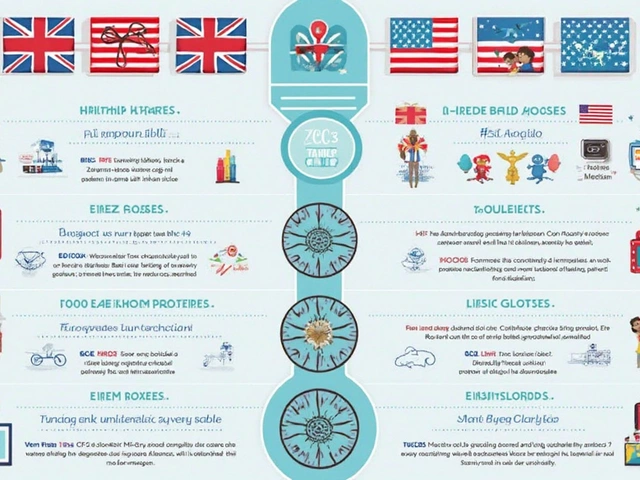Gaining admission to Harvard is a dream harbored by many students worldwide. Holding A-level qualifications can certainly make this dream a reality, but it's essential to understand how these fit into Harvard's admissions landscape. The university, known for its selective nature, does not merely glance at grades but evaluates the applicant as a whole.
Students presenting A-level results must demonstrate academic excellence, of course, but they should also be prepared to showcase what makes them unique and how they would contribute to Harvard's vibrant community. With thoughtful subject choices and a compelling personal statement, your A-levels can open the door to one of the most prestigious universities.
- A-Level Overview
- Harvard's Admission Criteria
- Subject Choice Importance
- Grades and Scores Needed
- Comparison with American Qualifications
- Tips for a Successful Application
A-Level Overview
The Advanced Level, commonly known as A-levels, is a leading school qualification in the United Kingdom and is recognized by universities around the world. These qualifications are typically undertaken by students aged 16 to 18 over the span of two years. Renowned for their rigorous curriculum and focus on a deep understanding of subjects, A-levels allow students to specialize in subjects that interest them the most. Typically, students will select three or four A-levels, focusing their studies to gain detailed knowledge and skills in these specific areas. The decision of which subjects to pursue is pivotal, as it not only paves the academic path but also highlights the student's aptitude and enthusiasm in the chosen fields.
The grading system for A-levels extends from grades A* to E, with A* showcasing exceptional proficiency. Universities, including prestigious ones like Harvard, respect these grades due to their stringent assessment standards. For instance, a student might choose Mathematics, Chemistry, and Biology if aspiring towards a career in medicine, thereby demonstrating both breadth and depth in training. Interestingly, according to UCAS, the UK’s university admission service, over 250,000 students annually take A-level exams, underlining their prevalence. An integral aspect of their value lies in the balance between coursework and final examinations, which tests students' commitment and understanding. A well-rounded A-level education not only equips students with in-depth academic knowledge but also fosters critical thinking and analytical skills, which are highly valued by universities globally.
"A-levels are great preparation not just for university but for career success since they provide skills and experience that help you succeed in later life." — Cambridge Assessment International Education
One essential point of interest is the way A-levels align with the requirements of universities like Harvard. While these universities often have their own entrance exams or essays, A-levels serve as a clear indicator of a student's capability and preparedness for higher education. Universities regard the A-levels highly because of their demanding syllabi and comprehensive assessments, which means they are often directly comparable to American Advanced Placement (AP) courses. With Harvard assessing each student's application with a holistic perspective, A-levels can certainly play an influential role in demonstrating academic prowess. Preparing for A-levels involves detailed study plans, consistent revision, and, often, the help of tutors or additional resources to master the subjects. All of these elements collectively present the A-levels as a robust foundation for future academic and professional successes.
Harvard's Admission Criteria
Admission to Harvard is indeed an illustrious achievement and a significant goal for many talented students. The process here is as thorough as it is competitive, requiring applicants to demonstrate more than just academic prowess. While Harvard does not set fixed requirements for grades or test scores, it places a strong emphasis on well-roundedness and outstanding personal attributes. The admissions committee evaluates prospective students holistically, looking for individuals who not only excel in their chosen A-level subjects but also contribute uniquely and positively to the university community.
One of the initial filters in the application is of course academic performance. Students are expected to achieve high scores in their A-levels. Ideally, applicants should be aiming for grades like A* or A to be competitive. Beyond grades, Harvard pays close attention to other standardized tests like SAT or ACT scores. Although there is flexibility in test requirements, particularly for international students, those metrics often act as benchmarks reflecting academic readiness. A standout application also features strong letters of recommendation, good evidence of leadership and initiative, and a well-crafted personal statement that aligns with the applicant's ambitions and Harvard's values.
Importantly, Harvard values individuality and diverse experiences. Participation in extracurricular activities, whether in arts, science, or leadership roles, plays a pivotal role. An applicant's potential to succeed at Harvard extends beyond books and exams. There is a great interest in understanding what drives a student, what passions they hold, and how they engage with the world around them. As John McDonough once emphasized in an alumni interview, "Harvard seeks those who dare to stand apart, for they will stand best in the future." This ethos captures the essence of Harvard's ideal applicant—someone with a passion that sparks change and a vision that inspires.
For international students, having a diverse application that indicates strong proficiency in English is also necessary. Understanding that language proficiency can be showcased through TOEFL or IELTS scores, where required, can add some clarity. For those outside the existing school systems and unfamiliar with the GPA model, these tools help bridge communication. The committee appreciates a student's comprehension and expression, crucial for coping in an environment where dialogue and debate are a staple of the learning process. Additionally, presenting evidence of scholarships, awards, and significant achievements can bolster one's application, revealing merit and dedication.
The admissions process also incorporates interviews as a pivotal element, though not mandatory for all applicants. Students who do face interviews should be prepared to discuss their academic interests, personal accomplishments, and potential contributions to the Harvard community. This is a platform to showcase personality and communication skills in a real-world context. Interviews can be conducted by alumni and are considered when available. The insights gained from these face-to-face interactions often provide the admissions team a clearer picture of a candidate's readiness and fit for the university culture.
While navigating the admissions landscape might seem daunting, understanding each component can help delineate a clearer path to success. Preparing meticulously, focusing on a comprehensive profile rather than isolated achievements, is key to crafting a compelling narrative. For the applicants showcasing their A-levels, there is indeed a path to Cambridge, Massachusetts. It's about telling a story that Harvard finds compelling enough to invest in, contributing to that ever-growing mosaic of minds that define the university's legacy.

Subject Choice Importance
Choosing the right subjects for your A-levels can significantly impact your chances of being admitted to Harvard. Not all subjects are valued equally by this elite institution, and it's crucial to choose those that are both challenging and relevant. Harvard values intellectual curiosity and strength in subjects that demonstrate a student's ability to engage with complex material. Typically, this means favoring traditional and rigorous A-levels like Mathematics, Sciences, and Humanities over more vocational ones. These subjects not only showcase your academic abilities but also your readiness for the demanding nature of Harvard's curriculum.
When selecting your subjects, remember that Harvard also looks for depth and breadth in an applicant's coursework. They appreciate students who are specialists as well as those who have a broad range of subjects. For example, while taking A-level Mathematics, Physics, and Chemistry could display your affinity for STEM subjects, adding an A-level like English Literature might demonstrate your versatility and ability to think critically about complex topics. This range not only reflects well on your application but also prepares you for the wide array of learning experiences at the university.
Matching Subject Choices to Intended Majors
It's also wise to align your A-level subjects with the field of study you intend to pursue at Harvard. If you're aiming for a major in economics, including subjects like Mathematics and Economics in your A-level selection would be beneficial. Similarly, prospective humanities students should aim to include subjects like History, Geography, or Languages to align with their future studies. Such strategic selection not only highlights a clear sense of purpose in your academic journey but also signals to admissions officers that you are well-prepared for the demands of their program. Additionally, showing proficiency in areas relevant to your intended major can help close the gap between different educational systems, an important consideration for international students.
The importance of subject choice is echoed by many experts in the field. Former Harvard admissions officer Sally Motch, for example, once said, "We look at the candidate's school performance in the context of the available opportunities. We admire students who demonstrate excellence in a range of disciplines." This insight emphasizes how subject choice, when wisely executed, plays a significant role in crafting a compelling application. It is essential to research thoroughly and consult with educational advisors to choose the most aligned and beneficial A-levels.
Remember, too, that Harvard appreciates passion and initiative. If you're particularly engaged in a subject not traditionally seen as prestigious but have excelled or achieved significant accomplishments, this can set you apart. It's less about fitting a specific mold and more about showing passion, discipline, and potential. Ultimately, the subjects you choose should not only meet the academic thresholds set by Harvard but should reflect who you are and what you bring to the collegiate table. Assembling a strong application with thoughtful A-level choices can help shine a light on your academic abilities and personal aspirations, setting you on the path to success at Harvard.
Grades and Scores Needed
When considering an application to Harvard with A-levels, understanding the necessary grades and scores is crucial. Harvard University is globally recognized for its academic rigor and, as such, expects a high standard from applicants. Generally, successful applicants present A-level results with grades A* or A in their core subjects. The importance of achieving top grades cannot be overemphasized. This level of academic excellence showcases your ability to thrive in a demanding educational environment like Harvard.
While there isn't an official cutoff for the number of A-levels required, most competitive candidates tend to present at least three subjects. Achieving top grades in these subjects is vital, but Harvard also considers the intellectual challenge of the subjects chosen. Therefore, opting for A-levels in Mathematics, Sciences, or Humanities can be particularly advantageous if appropriately aligned with your intended field of study. Candidates are encouraged to undertake subject combinations that demonstrate their strengths and intellectual interests.
Aside from A-level grades, standardized test scores such as the SAT or ACT are also typically required. Harvard's admissions process is holistic, and standardized tests serve as just one piece of the puzzle. For those wondering about scores, successful applicants often score in the 1500+ range for the SAT, or 33+ for the ACT, reflecting their readiness to tackle Harvard's academic challenges. However, while these scores are competitive, they don't guarantee admission. Applicants are evaluated based on a combination of grades, test scores, and other aspects such as extracurricular achievements and personal essays.
As Jeffrey Brenzel, former Dean of Undergraduate Admissions at Yale, once said, "Success at Harvard involves intellectual engagement, leadership, and a passion for discovery beyond mere numbers." This insight serves to remind students that their grades and scores, while critical, form just one component of the comprehensive evaluation process.
It is also worth noting that during recent years, some flexibility has been introduced to standardized testing requirements due to the pandemic's impact. Students should regularly check Harvard’s latest admissions guidelines to understand current requirements. Keeping abreast of such updates ensures that applicants can prepare their applications to meet all necessary criteria and take the most strategic approach in highlighting their academic achievements and potential contributions to the Harvard community.
Finally, international applicants with A-levels should focus on demonstrating their global perspectives and unique experiences in their application materials. Harvard values the rich diversity that international students bring to campus, making the qualitative aspects of your application as essential as the quantitative metrics.

Comparison with American Qualifications
When contemplating the admission process at Harvard, understanding the nuances between A-levels and American qualifications is crucial. The A-level system, predominantly used throughout the United Kingdom, offers a pathway markedly different from the American high school diploma. With A-levels, students delve deeply into three or four subjects, often achieving a level of expertise more akin to lower-level university studies. In contrast, the American education system prioritizes breadth over depth, encompassing a wider array of subjects, which provides students with a generalist perspective.
American high school education concludes with the awarding of diplomas and often culminates in standardized tests, such as the SATs or ACTs, playing a pivotal role in college admissions. These tests are designed to assess a broad range of knowledge, gauging proficiency in math, reading, and writing across a spectrum of subjects. Meanwhile, A-level exams focus intensively on subject specifics, demanding not only knowledge retention but also analytical prowess and critical thought. Harvard acknowledges these differences and appreciates the depth A-level students can bring, yet they do seek assurance that applicants can succeed in a broad, multidisciplinary environment.
The grading scales also differ significantly. Where American schools might use a GPA on a 4-point scale, A-levels follow an alphabetical scale spanning from A* to E. Generally, the top universities like Harvard look favorably upon A* and A grades, akin to a perfect or near-perfect GPA. This makes it imperative for A-level students to strive for top marks in their chosen subjects, demonstrating both mastery and a strong work ethic. Harvard admission officers are experienced in contextualizing these grades within the broader educational frameworks of different countries, ensuring a fair assessment of all international applications.
According to a report from the National Center for Education Statistics, approximately 15% of Harvard's undergraduate population comprises international students, underscoring the university's commitment to diverse educational backgrounds.
"Our goal is to understand the context of each student's educational journey," stated a Harvard admissions officer. "We appreciate the rigorous academic focus A-levels provide, but we look for students who also demonstrate adventurism in their learning."Although rigorous, the A-level pathway aligns well with the expectations of elite American universities, which often attract students seeking to specialize intensively. This makes your choice of A-level subjects crucial, as it can reflect your academic interests and potential career trajectory more clearly than a broad American high school course load might.
It's imperative for A-level applicants to also comprehend the cultural and experiential expectations of a US university education. The American college experience places substantial value on extracurricular involvement and leadership, aspects that A-level students might not have been able to prioritize extensively due to their heavy academic focus. Thus, when preparing a college application for Harvard, students should aim to communicate their broader interests and contributions. This could balance the perceived lack of extracurricular breadth inherent in the typical A-level experience.
Tips for a Successful Application
Applying to Harvard with A-levels requires thoughtful planning and a deep understanding of what the admissions officers are looking for. First and foremost, your academic record must reflect not only high grades but also a challenging course load. Choose your A-level subjects wisely, ensuring they align with your intended field of study or demonstrate a broad academic interest. Equally important is showing a passion or dedication that transcends academics – this could be through extracurricular activities, volunteer work, or personal projects that highlight your initiative and leadership skills.
An often overlooked element is the power of a compelling personal statement. This is your opportunity to narratively connect your past experiences and future ambitions. Remember to be genuine; Harvard is searching for authenticity and depth. Write about experiences that shaped you, challenges you overcame, and what you learned. It's essential to illustrate how your unique perspective will enrich the Harvard community. For instance, an applicant who has led efforts in climate action can emphasize real-world impact, proposing to join Harvard's environmental initiatives on campus.
"Our office could fill the class many times over with academically qualified students. What we try to do is look beyond the scores and grades," said Jeff Neal from Harvard's admissions office, highlighting the significance of a holistic review process.
Maximize the potential of your A-levels by securing strong letters of recommendation from teachers who know you well. These should affirm your intellectual curiosity and ability to contribute to class discussions, showcasing characteristics that set you apart. Engage your recommenders; share your motivation for pursuing your chosen field and any endeavors that illustrate your dedication.
Preparing for the standardized testing requirements of American universities, like the SAT or ACT, is crucial. Understand that these scores complement your A-level performances, giving Harvard a clearer picture of your aptitude. Dedicating time to prepare can emphasize your readiness to tackle rigorous academic challenges. Moreover, keep in mind deadlines and specific requirements for international students. Stay organized by creating a timeline for application completion and meeting financial aid deadlines if needed.
Finally, engage in mock interviews to hone your communication skills. Harvard’s interview process often delves into both your academic interests and personal attributes. Practicing articulate responses to questions about your passions, ambitions, and why you chose Harvard can make a significant difference. Embrace your unique voice and story. By showing that you are driven, yet grounded, you’ll resonate well across Harvard’s values of innovation and community.






